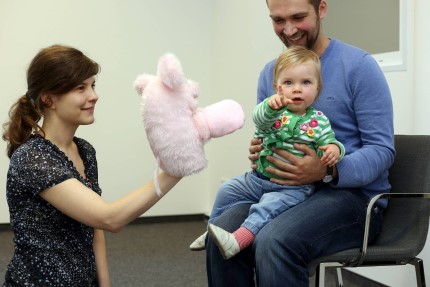Sleeping to remember or sleeping to forget?

Dr Seehagen with her daughter and husband
Posted: Thu, 3 Nov 2016
In human adults, sophisticated memory processes take place during sleep. These are vital for our everyday functioning. For instance, we consolidate recently learned information and connect existing knowledge. Sleep even regulates how our memory processes facts and emotions.
Although both memory and sleep undergo dramatic changes during infancy, little is known about their relationship during this important period of development. A new Marsden Fast-Start project will test if sleep makes effective processing of emotional stimuli and experiences easier for 6 to 18-month old infants.
Dr Sabine Seehagen from the University of Waikato, along with colleagues from Australia and Germany, will focus on sleep-dependent processing of different types of emotional memories and whether being well-rested versus tired affects the ability of 6-month-old infants to recognise emotional faces. First, they will determine the effect of timing of sleep; does being well-rested or tired affect the ability of 6-month-olds to recognize emotional faces?
Next, the researchers will aim to discover if taking a nap versus staying awake after learning makes it easier for 6 to18-month old infants to selectively consolidate memories for emotional faces (sleeping to remember), or lessen the effects associated with recalling emotional episodes (sleeping to forget).
Researchers predict that previous sleep prepares the infant brain to accurately encode emotional stimuli. They also predict that post-learning sleep promotes selective retention of emotional information and reduces the emotional ‘tone’ associated with recalling an emotional event.
Knowing more about how sleep shapes emotional memory and thus regulates which experiences are likely to stick with an infant and in which form, will contribute to a deeper understanding of adaptive and maladaptive development.
Dr Seehagen's daughter asleep
Total Funding: $300,000 (excl. GST) over 3 years
Researchers: Dr Sabine Seehagen, School of Psychology, University of Waikato, Private Bag 3105, Waikato Mail Centre, Hamilton 3240
